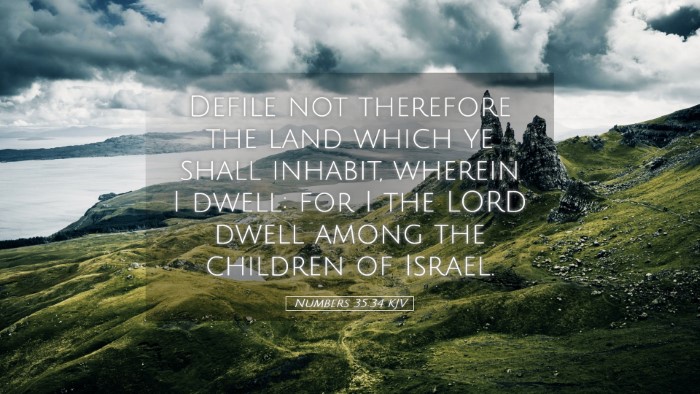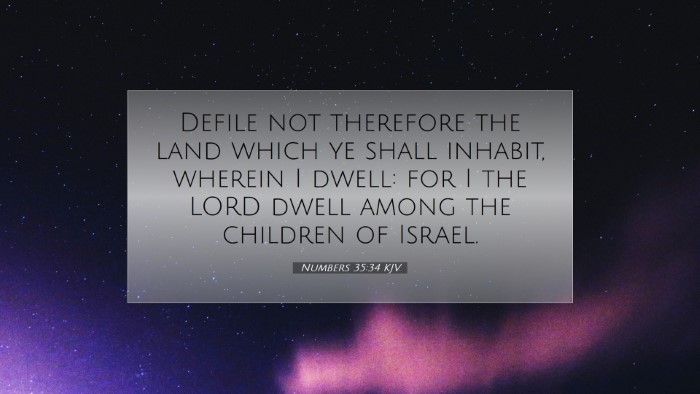Commentary on Numbers 35:34
Numbers 35:34 states: "Defile not therefore the land which ye shall inhabit, wherein I dwell: for I the Lord dwell among the children of Israel." This verse serves as a crucial reminder of God's presence in the midst of His people and emphasizes the necessity of maintaining holiness in the land He has given them.
The Theological Implications of God Dwelling Among His People
One of the most profound aspects of this verse is the declaration of God's presence among the Israelites. As observed by Matthew Henry, the enabling nature of God's presence is foundational to the covenant relationship between God and His people. He emphasizes that the land promised to Israel is not just a physical territory but a sacred space that is to be treated with reverence.
Albert Barnes points out that this divine presence demands a particular standard of holiness. The call not to defile the land signifies that moral and ethical behavior directly impacts the community's relationship with God. The land itself becomes a witness to the actions of the people; defilement not only brings judgment but a distancing from God's protective presence.
Exegesis of 'Defile' and the Concept of Holiness
The term "defile" translates from the Hebrew root טמא (tame), denoting pollution or making unclean. Adam Clarke elaborates that this defilement relates to moral and ceremonial laws that are crucial in maintaining the sanctity of God's dwelling place. The land, as articulated in verse 34, encapsulates a spiritual dimension wherein the actions of its inhabitants directly affect God's glory.
Thus, holiness is not an abstract concept but one that has tangible consequences. Clarke notes that the Israelites, as God’s chosen people, are called to a lifestyle that reflects their identity as a nation set apart. Their care for the land mirrors their devotion to God.
Relationship Between Sin and Divine Presence
The juxtaposition of defilement and divine presence invites deeper engagement with the theological implications of sin. Matthew Henry articulates that sin disrupts the harmony that God desires with His creation. He stresses the importance of recognizing that every act of disobedience has repercussions not only for the individual but for the community as a whole.
Furthermore, Albert Barnes emphasizes that the presence of sin in the camp ultimately leads to God's withdrawal. This has historical precedence in the narrative of Israel; when the people turned away from God's commandments, they experienced calamity and desolation. Therefore, maintaining purity and righteousness in behavior is paramount to preserving the intimate relationship with the Lord.
The Application of Numbers 35:34 Today
For contemporary believers, the exhortation found in Numbers 35:34 transcends historical context and speaks to current faith practice. In a world that often embraces moral relativism, the call to avoid defilement is as pertinent now as it was in ancient Israel. Adam Clarke asserts that believers today must consider how societal attitudes toward sin and holiness affect their faith communities.
- Righteous Living: The verse challenges Christians to examine their lifestyle choices, ensuring they reflect the holiness expected in a community that claims to host the presence of God.
- Community Responsibility: Just as the Israelites were responsible for the spiritual health of their land, modern believers are called to support one another in righteousness, fostering an environment conducive to God's presence.
- Awareness of God's Presence: Recognizing that God dwells among His people instills a sense of reverence and accountability, encouraging believers to cultivate a sacred atmosphere in their worship and community interactions.
Conclusion
Numbers 35:34 is not merely a historical admonition but a timeless directive that urges believers to live in a manner that honors God's presence. Through a combined understanding from the commentaries of Matthew Henry, Albert Barnes, and Adam Clarke, the depth of this verse reveals the interconnectedness of morality, community, and divine relationship. As God's people, an unwavering commitment to holiness ensures that the land we inhabit remains a wellspring of His glory.


